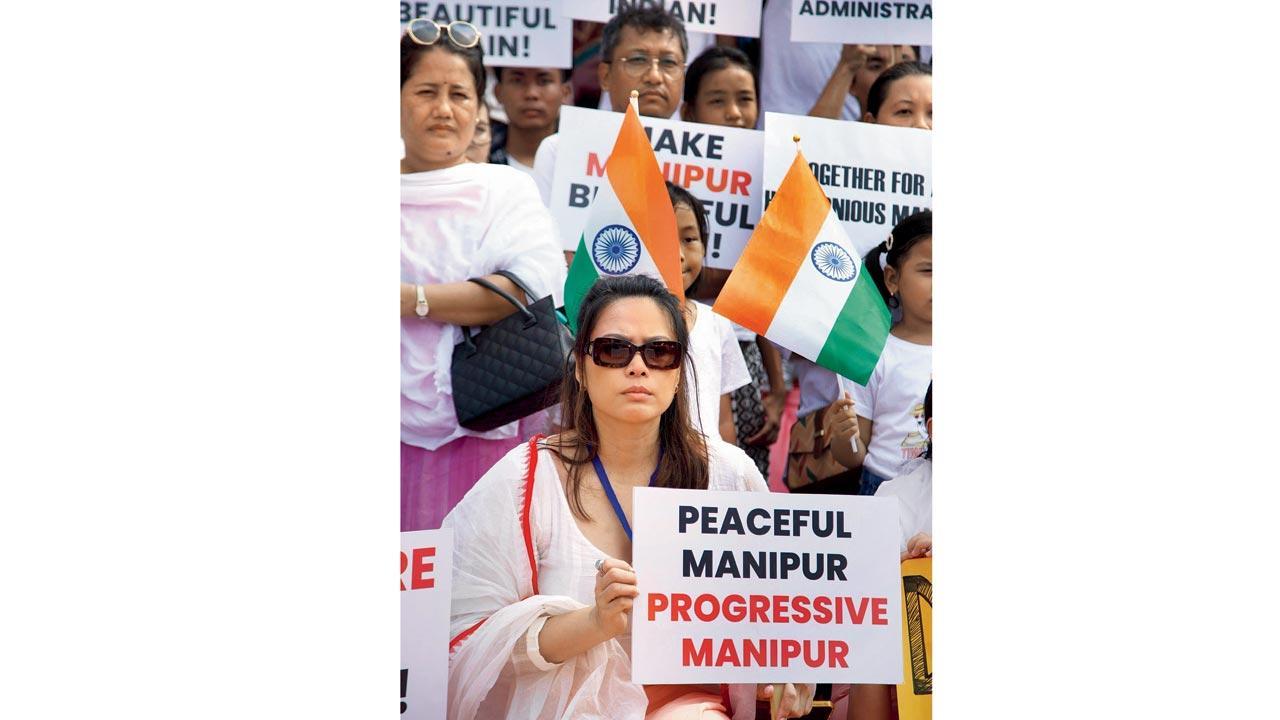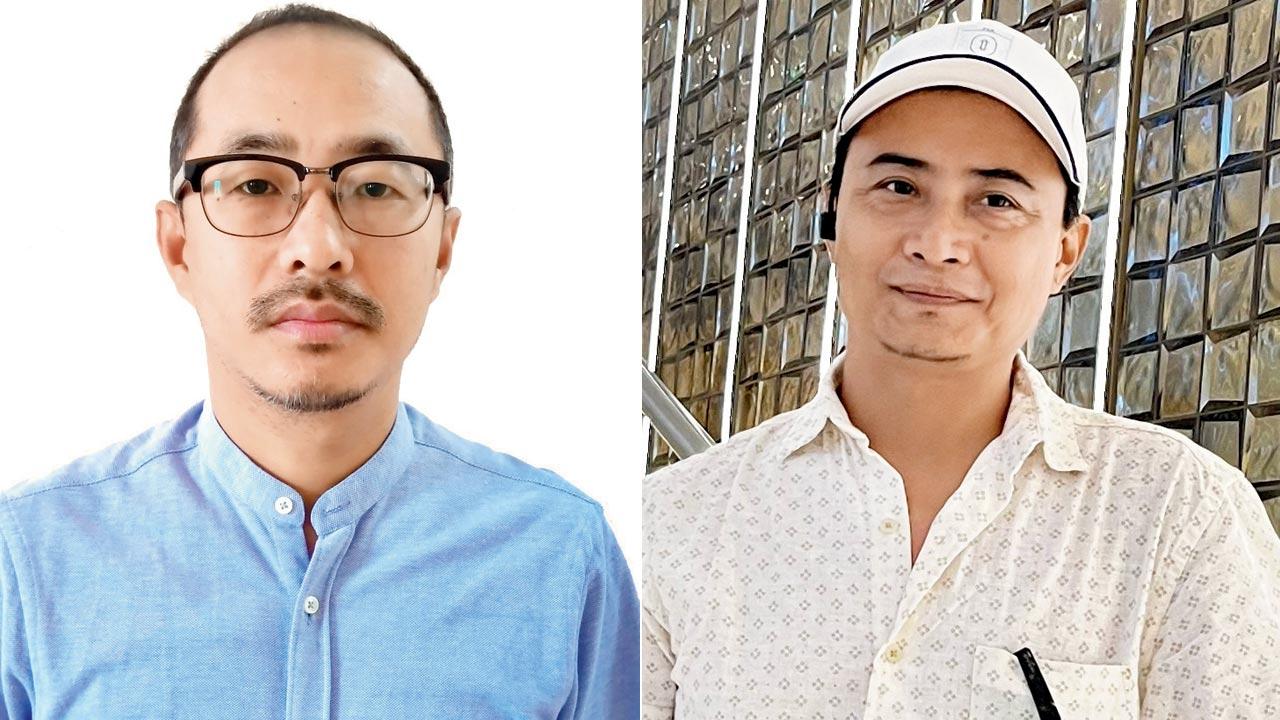With the crisis in their homeland showing no signs of abating, helpless Manipuris in Mumbai with families caught in the thick of the violence, demand Centre’s intervention

Lin Laishram holds up a placard at a protest in Azad Maidan on June 17, demanding peace in her homeland
Our families have been living in unimaginable trauma since May 3,” says 37-year-old model-actor Lin Laishram. On June 17, Mumbai-based Laishram, who belongs to the Meitei tribe of Manipur, led a protest at Azad Maidan demanding intervention in her volatile homeland.
ADVERTISEMENT
The ongoing conflict in Manipur between the two ethnic groups—Kuki and Meitei—has led to widespread violence and death. Laishram has a lot of Kuki friends, and admits that the situation has been awkward, but “I do check up on them, asking if they are okay, or whether they have eaten, and if they are safe”. “We cannot lose our humanity in this bloodshed,” she says, “I want peace... this brutal violence has to come to an end.”
Laishram’s parents and brother live in the Imphal East district, where for the last many days, there has been no internet. “My parents are in their 70s. When the violence broke out, I told them to come to Mumbai. They said that they would not leave their motherland. It was hard for me to hear this,” she says, “I haven’t even seen their faces, as I can’t make a video call.” Her nephews and nieces are having a difficult time as well. “The children are not sleeping enough. They can hear the sound of gunfire, the burning homes and screams. This is just adding to their anxiety.”
 Somatai Raleng and Byum Ripunjoy
Somatai Raleng and Byum Ripunjoy
The multiple curfews have also made it impossible to coordinate relief work. Laishram and some of her Manipuri friends in Mumbai have been trying to send out food and other essentials via the women’s group Meira Paibi, which dates back to the time when the Armed Forces (Special Powers) Act (AFSPA) 1958 was enacted in the northeast state.
Byum Ripunjoy, an associate director with the Amazon Prime series Criminal Minds, fears there will be an agrarian crisis in the valley soon. “Rice cultivation usually takes place during this season. But, no one has been able to go to the paddy fields, so the whole valley and hills will be seeing a food shortage next year. This is the part that really scares me,” he says.
Ripunjoy, who belongs to the Meitei community, says that the Centre will have to step in and stop the violence. “My sisters children have not be able to attend school since May—the way things are going, there will be no board examination in Manipur next year,” he says.
Manipur has three main tribes—the Meiteis, the Nagas, and the Kukis. The Meiteis constitute 53 per cent of the total population and are primarily settled in the Valley districts of East and West Imphal. The Nagas (17 per cent) and Kuki communities (26 per cent) are part of the Scheduled Tribes in the state. According to reports, one of the immediate triggers for the ethnic violence was the contentious March 27 High Court order, which had directed the State government to recommend the inclusion of the Meitei community in the Scheduled Tribes list. The Manipur HC on June 19 admitted a review petition seeking to modify its order.
The reality is that no group has been untouched by the violence. Lett Kuki, who has been working in Mumbai for over a decade, got a call from his uncle on May 4. The family home was plundered and burned. “My uncle stays in a predominantly Kuki colony within Imphal city; a day after the violence broke out, a group of men barged into the society, and started ransacking homes. My uncle and aunt and their son and daughter managed to escape, only with some clothes,” he says, “They hid in a Naga colony next door. The following day when they called their neighbours, they learnt that their home had been burned down. In fact, someone sent my uncle a video of his house going up in flames, and told him not to return.”
The family somehow made their way to a camp; Lett was able to fly out his uncle and aunt to Guwahati. “My nephew had already completed his first year in BA, but the certificate was burnt along with the house; he has taken admission to a college in Mumbai, and will be repeating the year again. My niece, on the other hand, is traumatised. She is staying with my other cousin in Mumbai, but hardly speaks. The family is grieving the loss of their home, and the life that they were forced to leave behind.”
Somatai Raleng, president of Tangkhul Welfare Society Mumbai, is a Naga Manipuri. He reveals that while his community is not a stakeholder in the conflict, angry mobs do not care for these distinctions or nuances. “Four women who were on their way to Mumbai from Imphal were accosted on the way to the airport. They are from Mumbai and were on an holiday in Manipur. One of them was also physically attacked. The violence hasn’t spared anyone.”
 Subscribe today by clicking the link and stay updated with the latest news!" Click here!
Subscribe today by clicking the link and stay updated with the latest news!" Click here!







